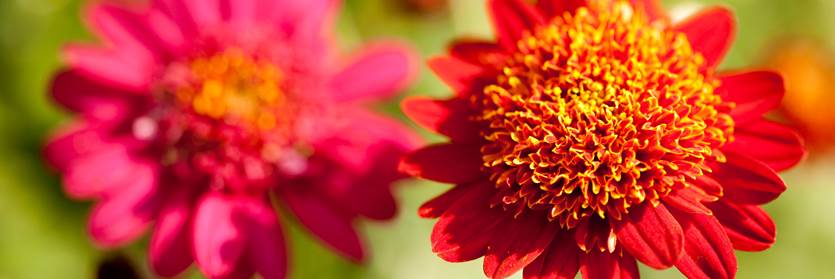Inside The New York Botanical Garden
Darwin’s Garden
Posted in Around the Garden, Darwin's Garden, Gardens and Collections, The Orchid Show on March 29 2012, by Joyce Newman
Joyce H. Newman is a Garden Tour Guide with The New York Botanical Garden.
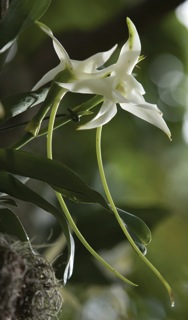 Of the many thousands of orchids on display during the Orchid Show, the two most requested flowers are the vanilla orchid and what is known as Darwin’s orchid.
Of the many thousands of orchids on display during the Orchid Show, the two most requested flowers are the vanilla orchid and what is known as Darwin’s orchid.
The exquisite ivory, star-shaped blossoms of Darwin’s star orchid (Angraecum sesquipedale) are famous for their association with Charles Darwin and his theory of evolution.
Read More
Posted in Darwin's Garden, Exhibitions, People, Science on February 12 2009, by Plant Talk
 Carol Capobianco is Editorial Content Manager at The New York Botanical Garden.
Carol Capobianco is Editorial Content Manager at The New York Botanical Garden.
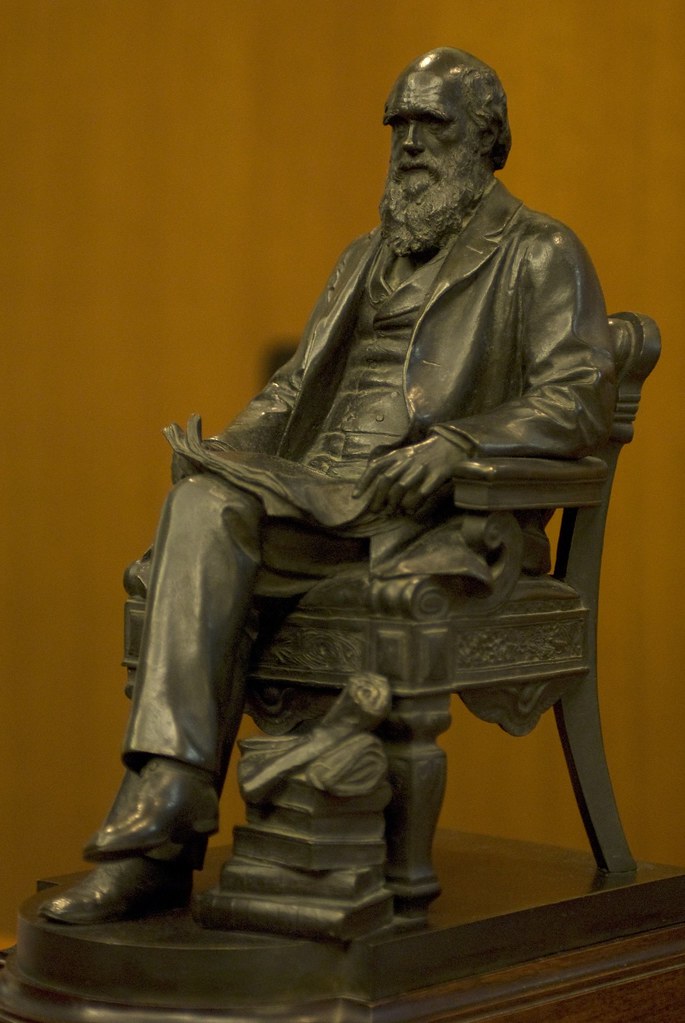 Charles Darwin (shown in bronze in a sculpture in the Rare Book Room) was born on this day in 1809, sharing the exact same birthday as Abraham Lincoln—though a world away in England.
Charles Darwin (shown in bronze in a sculpture in the Rare Book Room) was born on this day in 1809, sharing the exact same birthday as Abraham Lincoln—though a world away in England.
Last spring the Botanical Garden celebrated his work with plants in the Garden-wide exhibition Darwin’s Garden: An Evolutionary Adventure as a lead-in to this bicentennial year, which also marks the 150th anniversary of his groundbreaking book. (We can’t tell you the name of it here, because it’s one of the questions in the short quiz below).
During the show, some of the world’s leading Darwin experts had gathered to discuss the far-reaching legacy of Charles Darwin and the implications of his thinking for science and society today in a special two-part symposium, Darwin: 21st-Century Perspectives, hosted by the Garden and the American Museum of Natural History, and which you can hear by clicking here.
If you first need a Darwin 101 refresher before listening to these scholars, test yourself with these few questions. The answers are provided after the jump.
Or, if you want to learn about Darwin in song, check out this snippet taped partly in the Enid A. Haupt Conservatory recently of live performer and Darwin scholar Richard Milner. Milner performed his Charles Darwin: Live & In Concert at the Botanical Garden during last year’s exhibition and was featured this week in The New York Times.
And now for the quiz…
1. Darwin sailed to the Galápagos on a ship named…
a. Sundew
b. Retriever
c. Beagle
d. Albatross
2. Darwin began his formal studies in botany at…
a. Oxford
b. Cambridge
c. Glasgow
d. Edinburgh
3. How many children did Darwin have?
a. 10
b. 7
c. 3
d. None
4. Darwin is known as the founder of which famous theory?
a. Relativity
b. Big Bang
c. Quantum Mechanics
d. Evolution by Natural Selection
5. What was the title of Darwin’s book that changed the way scientists view all life?
a. Inherit the Wind
b. The World As I See It
c. Origin of Species
d. The Diversity of Life
Answers after the jump!
Read More
Posted in Darwin's Garden, Exhibitions, People on July 3 2008, by Plant Talk
Jane Dorfman is Reference Librarian/Exhibitions Coordinator in the LuEsther T. Mertz Library.
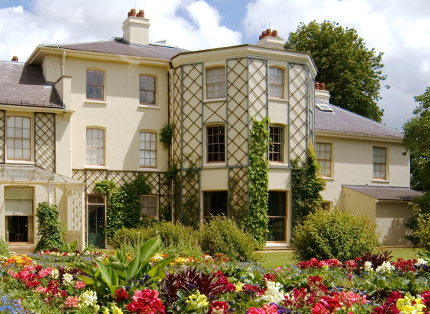 |
| © English Heritage Photo Library |
I just returned from a short visit to the United Kingdom where a colleague from the Royal Horticultural Society Lindley Library arranged for a private tour of Down House, the home of Charles Darwin. He lived there with his family for the last 40 years of his life, experimenting with plants.
The tour of the house and garden was led by author and conservationist Randal Keynes, a great, great grandson of Charles Darwin. Erudite and charming, Mr. Keynes offered insights and details about the life and work of his extraordinary relative that enlivened and inspired the experience.
Come and be inspired, as well, by the work of Charles Darwin in the Mertz Library’s Rondina Gallery exhibit, Darwin’s Garden: An Evolutionary Adventure, which continues until July 20.
Posted in Darwin's Garden, Exhibitions on May 15 2008, by Plant Talk
 As part of the Charles Darwin exhibition currently featured at The New York Botanical Garden, a special two-part symposium, Darwin: 21st-Century Perspectives, was hosted by NYBG and the American Museum of Natural History. The event was was open to the public and covered many facets of Darwin’s legacy and its implications on science and society. The event was a big success, and many people came to hear the distinguished lineup wax philosophical on one of the greatest scientific minds of the modern era.
As part of the Charles Darwin exhibition currently featured at The New York Botanical Garden, a special two-part symposium, Darwin: 21st-Century Perspectives, was hosted by NYBG and the American Museum of Natural History. The event was was open to the public and covered many facets of Darwin’s legacy and its implications on science and society. The event was a big success, and many people came to hear the distinguished lineup wax philosophical on one of the greatest scientific minds of the modern era.
Read More
Posted in Darwin's Garden, Exhibitions, NYBG in the News on May 12 2008, by Plant Talk
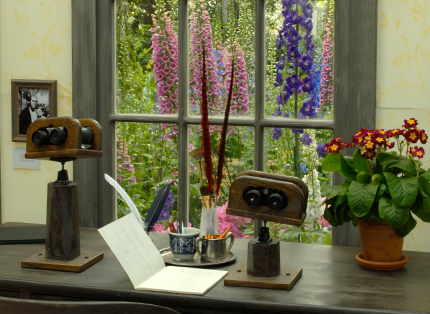 Scientific American’s Science Talk recently posted its latest episode online. The downloadable podcast recorded on April 23 features Dr. David Kohn, curator of the current exhibit in the LuEsther T. Mertz Library and nationally recognized Darwin scholar. Surrounded by original Darwin publications in the Library’s Rare Book Room, Dr. Kohn talks about the role of plants in Darwin’s early life and how his views on botany were integral in his understanding of evolutionary processes.
Scientific American’s Science Talk recently posted its latest episode online. The downloadable podcast recorded on April 23 features Dr. David Kohn, curator of the current exhibit in the LuEsther T. Mertz Library and nationally recognized Darwin scholar. Surrounded by original Darwin publications in the Library’s Rare Book Room, Dr. Kohn talks about the role of plants in Darwin’s early life and how his views on botany were integral in his understanding of evolutionary processes.
Dr. David Kohn is editor of the Darwin Digital Library of Evolution, based at the American Museum of Natural History.
Darwin’s Garden: An Evolutionary Adventure runs through July 20. Get Your Tickets!
Posted in Darwin's Garden, Exhibitions, Programs and Events on April 25 2008, by Plant Talk
 Beginning today at The New York Botanical Garden, the untold story of Charles Darwin’s lifelong fascination and work with plants will be presented in the exhibition titled Darwin’s Garden: An Evolutionary Adventure.
Beginning today at The New York Botanical Garden, the untold story of Charles Darwin’s lifelong fascination and work with plants will be presented in the exhibition titled Darwin’s Garden: An Evolutionary Adventure.
The exhibition will include living collections of plants and historical documents in three botanical venues: the Enid A. Haupt Conservatory, LuEsther T. Mertz Library Gallery, and Everett Children’s Adventure Garden. There is also an “evolutionary tour” of living plants, demonstrating key points on the evolutionary Tree of Life. It will paint a picture of Darwin as a naturalist and plantsman, and show how Darwin’s botanical experiments and discoveries helped share his contributions to the understanding of life in general.
Read More
 Of the many thousands of orchids on display during the Orchid Show, the two most requested flowers are the vanilla orchid and what is known as Darwin’s orchid.
Of the many thousands of orchids on display during the Orchid Show, the two most requested flowers are the vanilla orchid and what is known as Darwin’s orchid.